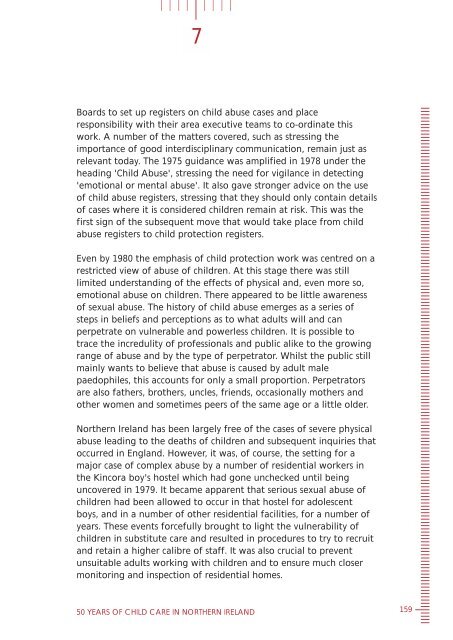childcare-50years
childcare-50years
childcare-50years
You also want an ePaper? Increase the reach of your titles
YUMPU automatically turns print PDFs into web optimized ePapers that Google loves.
7<br />
Boards to set up registers on child abuse cases and place<br />
responsibility with their area executive teams to co-ordinate this<br />
work. A number of the matters covered, such as stressing the<br />
importance of good interdisciplinary communication, remain just as<br />
relevant today. The 1975 guidance was amplified in 1978 under the<br />
heading 'Child Abuse', stressing the need for vigilance in detecting<br />
'emotional or mental abuse'. It also gave stronger advice on the use<br />
of child abuse registers, stressing that they should only contain details<br />
of cases where it is considered children remain at risk. This was the<br />
first sign of the subsequent move that would take place from child<br />
abuse registers to child protection registers.<br />
Even by 1980 the emphasis of child protection work was centred on a<br />
restricted view of abuse of children. At this stage there was still<br />
limited understanding of the effects of physical and, even more so,<br />
emotional abuse on children. There appeared to be little awareness<br />
of sexual abuse. The history of child abuse emerges as a series of<br />
steps in beliefs and perceptions as to what adults will and can<br />
perpetrate on vulnerable and powerless children. It is possible to<br />
trace the incredulity of professionals and public alike to the growing<br />
range of abuse and by the type of perpetrator. Whilst the public still<br />
mainly wants to believe that abuse is caused by adult male<br />
paedophiles, this accounts for only a small proportion. Perpetrators<br />
are also fathers, brothers, uncles, friends, occasionally mothers and<br />
other women and sometimes peers of the same age or a little older.<br />
Northern Ireland has been largely free of the cases of severe physical<br />
abuse leading to the deaths of children and subsequent inquiries that<br />
occurred in England. However, it was, of course, the setting for a<br />
major case of complex abuse by a number of residential workers in<br />
the Kincora boy's hostel which had gone unchecked until being<br />
uncovered in 1979. It became apparent that serious sexual abuse of<br />
children had been allowed to occur in that hostel for adolescent<br />
boys, and in a number of other residential facilities, for a number of<br />
years. These events forcefully brought to light the vulnerability of<br />
children in substitute care and resulted in procedures to try to recruit<br />
and retain a higher calibre of staff. It was also crucial to prevent<br />
unsuitable adults working with children and to ensure much closer<br />
monitoring and inspection of residential homes.<br />
50 YEARS OF CHILD CARE IN NORTHERN IRELAND<br />
159


